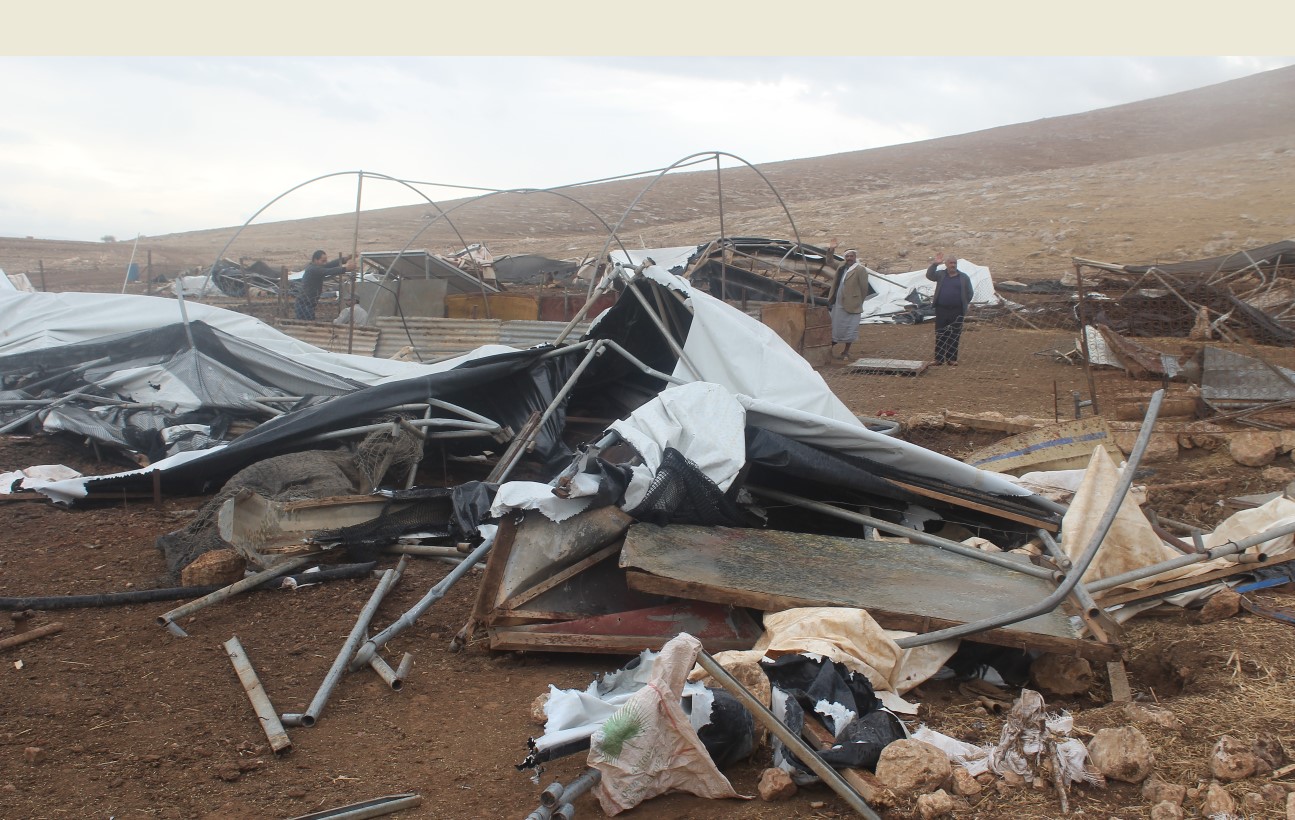Israeli forces once again wreaked havoc on Wednesday morning, February 3, in the small Arab Bedouin hamlet of Khirbet Humsa al-Fawqa, southeast of the city of Tubas in the northern part of the occupied Jordan Valley, trashing all the tents and other structures in the community. Local residents reported that Israeli forces had cordoned off the community before they raided it and entirely wrecked the Palestinian-owned dwellings.
The next day, Thursday, February 4, Israeli troops stormed the community and prevented activists from rebuilding shelters for the some 85 residents whose tents were demolished 24 hours earlier and were left without cover to protect them from the intense cold of the desert nights.
The village of Khirbet Humsa al-Fawqa has been the target of numerous demolitions by Israeli authorities during the past decade, the most recent previous one having been on November 3, 2020, election day in the United States (see earlier posts, below).

Remains of Khirbet Hamsa al-Fawqa in the northern Jordan Valley following Israel’s demolition of the hamlet on Wednesday, February 3, 2021 (Photo: Wafa)
Hadash MK Ofer Cassif (Joint List) condemned the demolition as “organized state terrorism, involving the ethnic cleansing of the indigenous population” for the benefit of the settlers who will be voting in the upcoming Israeli elections. Cassif called on the international community to immediately intervene, condemn the operation, and provide protection for the Palestinian residents in the villages, towns, and hamlets of the Jordan Valley who face large-scale demolition of their homes and the confiscation of their lands. You can hear Cassif’s address by clicking the second link below.
Cassif visited Khirbet Humsa al-Fawqa on Thursday afternoon, alongside Palestinian Prime Minister Mohammad Shtayyeh, Deputy Fatah Chairman Mahmoud al-Aloul, Chairman of the Anti-Wall and Settlement Commission Walid Assaf, Minister of Women’s Affairs Amal Hamad, Chairman of the Arab Higher Monitoring Committee in Israel and former Hadash MK, Mohammad Barakeh, representatives of churches and a host of European Union diplomats.
The Jordan Valley, a broad, fertile strip of land that extends along the west bank of the Jordan River, is home to about 65,000 Palestinians and makes up approximately 30% of the West Bank.
Since 1967, when the Israeli army occupied the West Bank, Israel has settled at least 11,000 of its Jewish citizens in the Jordan Valley. Some of these settlements were built almost entirely on private Palestinian land.
Since the start of its occupation in June 1967, the Israel military has designated about 46% of the Jordan Valley as a closed military zone, utilizing the pretext of military drills to forcefully displace Palestinian families living there, as part of Israel’s policy of ethnically cleansing and stifling Palestinian development of the area. Approximately 6,200 Palestinians live in 38 communities in places earmarked for military use meaning they have to obtain permission from the Israeli authorities to enter and reside in their communities.
In total violation of international law, Israel’s military not only temporarily displaces the communities on a regular basis, but also from time to time confiscates their farmlands and demolishes their homes and infrastructure. Besides undergoing temporary displacement, the Palestinian families living there face myriad restrictions on access to resources and services. Meanwhile, Israel exploits the resources of the area and generates profit by allocating generous tracts of land and water resources for the benefit of settlers.
Related:


